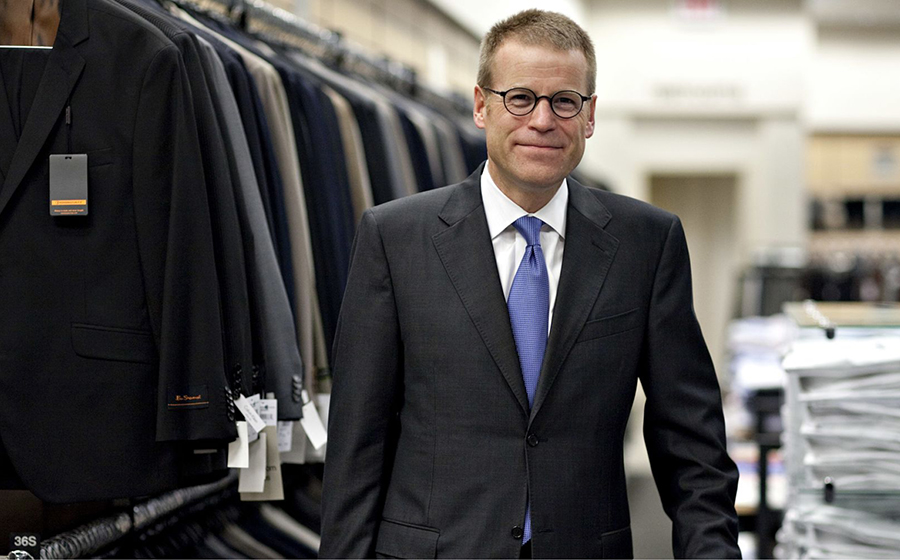My first memory of Blake Nordstrom goes back to 1993. While researching The Nordstrom Way, the company allowed me to attend an employee orientation meeting. After the twenty or so new Nordies viewed a twelve-minute company-history video called \”The Nordstrom Story,\” a tall, blond-haired, 33-year-old, walked to the front of the room to address the group.
\”I like to come to these meetings and meet our new people,\” he said warmly. \”My name is Blake and I\’m really excited to have you here.\”
At the time, Blake was vice-president and general manager of the Washington state and Alaska group of stores.
\”The first thing we tell new employees is that there\’s nothing new in customer service,\” Blake continued. \”We are fond of saying that the best training you can have is your parents. Did they teach you to be nice, and smile, and work hard?\”
That was Blake Nordstrom-trained by his father Bruce and his mother Fran (who passed away of cancer when Blake was 24). He was nice, smiled (a lot) and worked hard.
In 1993, Blake was one of seven Nordstrom scions of the fourth generation, who were working their way up through the ranks. As I watched him address the new employees, one thought popped into my head: \”That\’s the future leader of Nordstrom.\”
Fast forward to August 2000. Nordstrom was going through an existential crisis under the leadership of John Whitacre, a much-loved and highly-respected 24-year Nordstrom veteran, who was the first non-family CEO. For a variety of reasons, Nordstrom\’s business was wildly inconsistent-disappointing both Wall Street and Main Street. The opinion of the media was summed up in a Time magazine article with the headline \”Nordstrom Loses Its Luster\” and a color photograph of a crushed Nordstrom gift box wrapped in tattered ribbon. When Whitacre resigned, there was no obvious heir apparent.
After undergoing a national search for candidates from the outside the company (all of them well-recognized names in the industry), the Nordstrom board named Blake (then president of Nordstrom Rack) as president of the company that had been started by his great-grandfather in 1901. At the same time, the board asked Bruce to come out of retirement to once again be chairman.
Initially, Wall Street was unimpressed by the elevation of another family member to the top position. One so-called \”expert\” said, \”I don\’t see this as much of a change. [Blake] talked about customer service and about listening to customers, the same platitudes we have heard before.\” But it was those \”platitudes\” that made Nordstrom Nordstrom. With the steady guidance of their father, Blake, Pete and Erik went on to create one of the world\’s most admired companies.
The Nordstroms, at heart, are shopkeepers. The brothers and their cousin Jamie are constant presences in all the stores of Nordstrom\’s far-flung empire.
\”Blake Nordstrom could never be on the television program Undercover Boss because everyone would recognize him,\” joked Geevy Thomas, president of Nordstrom Rack. \”All of us are always in the stores. We are on the floor all the time.\”
The Nordstroms are famous for answering their own phones.
A couple of years ago, an 80-year-old long-time customer opened her monthly Nordstrom statement and was disappointed that the company had changed the format she had gotten used to over many decades. She phoned Nordstrom\’s corporate headquarters and asked to speak to someone in management. After a few rings, a voice answered the phone:
\”Blake Nordstrom.\”
\”Blake Nordstrom? You\’re the president,\” she exclaimed.
\”I am indeed.\”
\”What are you doing answering the phone?
\”Well,\” Blake deadpanned, \”I was sitting here at my desk, and the phone rang, so I picked it up.\”
Blake soon fixed her problem and later invited her to lunch.
In all the many tributes that people have paid to Blake, one word keeps popping up: humble.
Bruce\’s book Leave It Better Than You Found It, includes an interview with Ed Pepple the basketball coach at Mercer Island High School, which all three Nordstrom brothers attended. Unlike Pete and Erik, who later played on the varsity, Blake was the team manager-the guy who took down the baskets in the gym, brought out the basketballs, swept the floor, organized the equipment, and picked up the wet towels.
\”I think being the manager helped Blake with the team concept,\” said Pepple. \”He was a contemporary, a peer of all the guys on the team, who respected him. You can look at the job of manager as being a servant, or you can look at it as being part of the team, which is how Blake saw it.\”
On the day that Blake passed away, I kept reading all the tributes and memories that people shared on the \”Nordstrom Friends\” Facebook page. This one, from Romey Rancharan, is one of my favorites:
I met Blake at store 320 (Costa Mesa Brass Plum). One day he came to my dept. He looked around and said, \”What can I do for you?\” I replied, \”You can help me tear these boxes open if you want.\” He agreed to it and there we were ripping boxes open. At the end I thanked him and thought, what a nice guy, wearing a suit. I thought he was from Corporate. My co-worker, her name was May said, \”Do you know who that is?\” I said, \”No, but he was sweet and cute.\” She said, \”That was Blake Nordstrom. He shouldn\’t be ripping boxes open.\” I said, \”He wanted to.\” She was like, \”Good for him.\” Thank you Mr. Nordstrom.
At Nordstrom, the term \”servant leader\” is oft-cited as a cornerstone of the company\’s unique culture. Blake was the consummate servant leader.
Robert Spector is the author several books on Nordstrom, most recently The Nordstrom Way to Customer Experience Excellence: Creating a Values-Driven Culture (Wiley, 2017)




